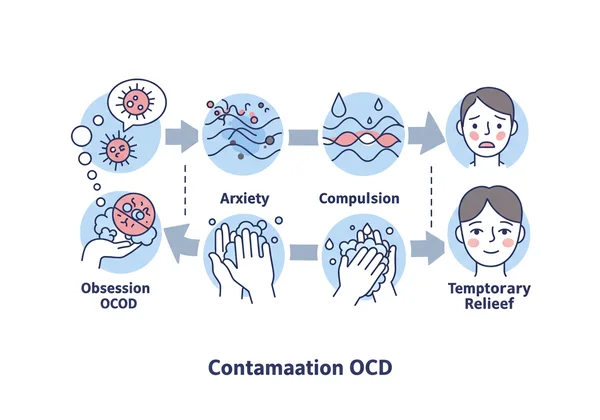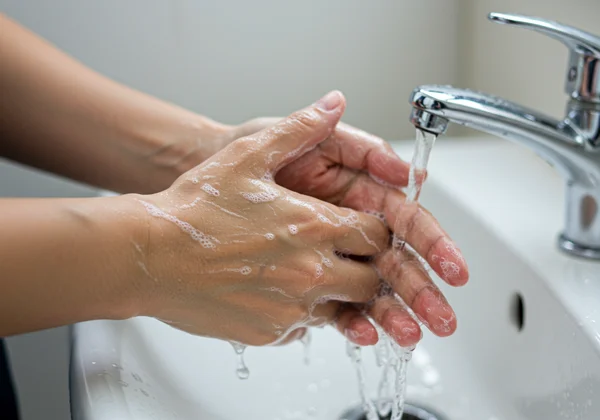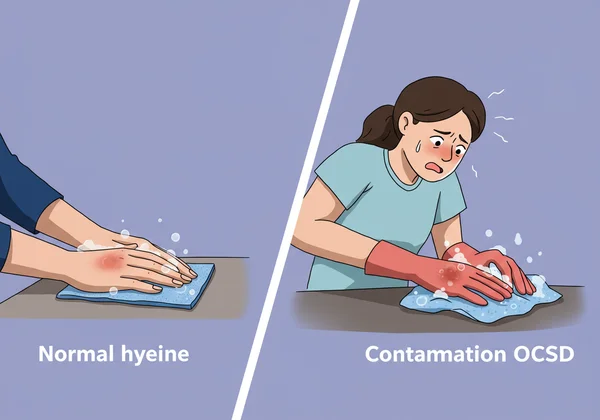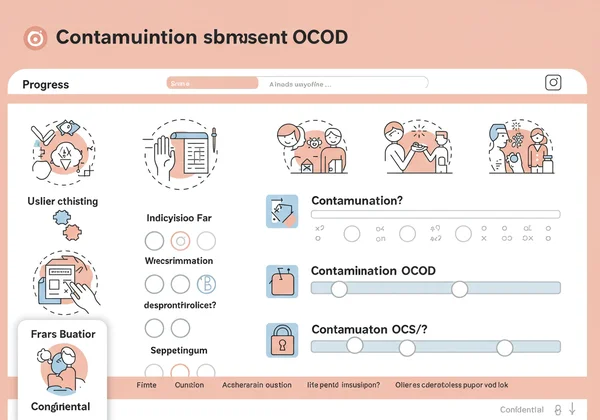दूषितता OCD परीक्षण: कीटाणुओं का डर और अत्यधिक सफाई
July 27, 2025 | By Samuel Griffin
क्या आप लगातार कीटाणुओं, गंदगी, या बीमार होने के बारे में चिंतित रहते हैं? क्या आपको अपने हाथ धोने, अपने घर को अत्यधिक साफ करने, या कुछ स्थानों से बचने की तीव्र इच्छा महसूस होती है, भले ही यह अतार्किक लगे? यदि ये प्रश्न आपके मन में गूंजते हैं, तो आप अच्छी स्वच्छता और कुछ और के बीच की रेखा के बारे में सोच रहे होंगे। यह लेख आपको दूषितता जुनूनी-बाध्यकारी विकार (Contamination OCD) को समझने में मदद करेगा, जो जुनूनी-बाध्यकारी विकार (Obsessive-Compulsive Disorder) का एक सामान्य उपप्रकार है, और आपको आत्म-मूल्यांकन के एक गोपनीय पहले कदम की ओर मार्गदर्शन करेगा। मुझे कैसे पता चलेगा कि मुझे OCD है? एक दूषितता OCD परीक्षण स्पष्टता के लिए एक मूल्यवान प्रारंभिक बिंदु हो सकता है।
अपने विचारों और व्यवहारों को समझना नियंत्रण की भावना पाने का पहला कदम है। ये पैटर्न, भले ही परेशान करने वाले हों, ऐसी चीजें हैं जिनका अनुभव कई लोग करते हैं। अंतर्दृष्टि प्राप्त करना आपको सही रास्ता खोजने के लिए सशक्त बना सकता है। एक निजी और अंतर्दृष्टिपूर्ण स्क्रीनिंग के लिए, आप हमारे प्लेटफ़ॉर्म पर अपना आत्म-मूल्यांकन शुरू कर सकते हैं।
दूषितता OCD क्या है? मुख्य लक्षणों को समझना
दूषितता OCD, जुनूनी-बाध्यकारी विकार (OCD) का एक विशिष्ट प्रकटीकरण है जो "दूषित" होने से संबंधित दखल देने वाले विचारों, भय और छवियों की विशेषता है। यह गंदगी के प्रति नापसंदगी से कहीं अधिक है; यह एक गहरा, अक्सर गहन भय है जो तीव्र चिंता का कारण बनता है। यह चिंता फिर एक व्यक्ति को भय को बेअसर करने और फिर से "स्वच्छ" या "सुरक्षित" महसूस करने के लिए बाध्यकारी व्यवहार या अनुष्ठान करने के लिए प्रेरित करती है।
अपने मूल में, इस स्थिति में जुनून (obsessions) और बाध्यताओं (compulsions) का चक्र शामिल होता है। यह प्रतिक्रिया चक्र तेजी से मांग वाला होता जा सकता है, जो दैनिक जीवन को महत्वपूर्ण रूप से प्रभावित करता है। इस चक्र को पहचानना अपने या दूसरों में संकेतों को समझने की कुंजी है।

दूषितता जुनून और बाध्यताओं का चक्र
दूषितता OCD अक्सर एक स्पष्ट, परेशान करने वाला पैटर्न का अनुसरण करता है। यह एक जुनून से शुरू होता है, जो एक अवांछित और बार-बार आने वाला विचार या छवि है जो तीव्र चिंता को ट्रिगर करती है। उदाहरण के लिए, दरवाजे के हैंडल को छूने से आपके हाथ पर घातक कीटाणु होने की भयानक छवि ट्रिगर हो सकती है।
इस तीव्र चिंता से राहत पाने के लिए, एक व्यक्ति को बाध्यता या अनुष्ठान करने की इच्छा होती है। यह दस मिनट तक लगातार हाथ धोना, एक निश्चित संख्या में पेपर टॉवेल का उपयोग करना, या दरवाजे के हैंडल से पूरी तरह से बचना हो सकता है। बाध्यता अस्थायी राहत प्रदान करती है, लेकिन यह इस विचार को पुष्ट करती है कि जुनून एक वास्तविक खतरा था, जिससे चक्र के भविष्य में दोहराए जाने और तीव्र होने की संभावना बढ़ जाती है।
सामान्य दूषितता जुनून (कीटाणु-भय OCD)
इस OCD उपप्रकार में जुनून दूषित होने के डर और संभावित परिणामों पर केंद्रित होते हैं। जबकि अक्सर इसे कीटाणु-भय OCD कहा जाता है, चिंताएं बहुत व्यापक हो सकती हैं। यदि आप संघर्ष कर रहे हैं, तो आप खुद को इसमें उलझे हुए पाते हैं:
- कीटाणु और वायरस: बैक्टीरिया, वायरस (जैसे फ्लू या COVID-19), और अन्य रोगजनकों का लगातार डर।
- शारीरिक तरल पदार्थ: स्वयं या दूसरों से रक्त, मूत्र, लार, या पसीने का तीव्र भय।
- रसायन और विष: घरेलू क्लीनर, कीटनाशकों, एस्बेस्टस, या विकिरण के बारे में चिंता।
- गंदगी और मैल: शारीरिक रूप से गंदा होने की सामान्य लेकिन भारी भावना।
- "जादुई" दूषितता: यह डर कि बुरे विचार, दुर्भाग्यपूर्ण संख्याएं, या कुछ लोग आपको भावनात्मक या आध्यात्मिक रूप से दूषित कर सकते हैं।
अत्यधिक सफाई और बचाव व्यवहार को समझना
बाध्यताएं वे क्रियाएं हैं जो जुनून से होने वाली चिंता को कम करने के लिए की जाती हैं। वे अक्सर सतह पर तार्किक प्रतीत होती हैं लेकिन अत्यधिक, दोहराव वाली और समय लेने वाली होती हैं। ये अनुष्ठान आनंद के लिए नहीं किए जाते हैं, बल्कि सुरक्षित महसूस करने की हताश आवश्यकता से किए जाते हैं।
सामान्य बाध्यताओं में शामिल हैं:
- अत्यधिक हाथ धोना: हाथों को तब तक धोना जब तक वे कच्चे, लाल, या फटे न जाएं।
- अनुष्ठानित स्नान: शॉवर में एक सख्त, लंबी दिनचर्या का पालन करना, कभी-कभी घंटों तक।
- बाध्यकारी सफाई: बार-बार घर की सतहों, कपड़ों, या खाद्य पदार्थों को साफ करना।
- बचाव: सार्वजनिक शौचालयों, अस्पतालों, भीड़, हाथ मिलाने, या यहां तक कि प्रियजनों को गले लगाने से बचना।
- आश्वासन की तलाश: दूसरों से लगातार पूछना कि क्या उन्हें लगता है कि कुछ दूषित है या क्या आप बीमार हैं।

क्या यह OCD है या सिर्फ स्वच्छ रहना? अपनी चिंताओं को अलग करना
स्वच्छता के प्रति सचेत रहना पूरी तरह से सामान्य और स्वस्थ है। हम सभी शौचालय का उपयोग करने के बाद और खाने से पहले अपने हाथ धोते हैं। तो, एक साफ-सुथरे व्यक्ति होने और संभावित रूप से दूषितता OCD होने के बीच रेखा कहाँ है? अंतर संकट और रोजमर्रा के कामकाज में रुकावट के स्तर में है जो व्यवहार का कारण बनते हैं।
एक व्यक्ति जो केवल स्वच्छ है, सार्वजनिक सतह को छूने पर तीव्र भय महसूस नहीं करता है। वे अपने हाथ धो सकते हैं और अपने दिन के साथ आगे बढ़ सकते हैं। दूषितता OCD वाले व्यक्ति के लिए, भय overwhelming होता है, और बाध्यताएं सुरक्षा की भावना को पुनः प्राप्त करने का एक हताश प्रयास होती हैं, जो अक्सर उनके जीवन को बड़े तरीकों से बाधित करती हैं। यदि आप अपनी आदतों के बारे में सोच रहे हैं, तो प्रारंभिक अंतर्दृष्टि प्राप्त करने का एक शानदार तरीका हमारा नि:शुल्क OCD परीक्षण लेना है।

जब स्वच्छता विघटनकारी हो जाती है: संकेत कि यह OCD हो सकता है
स्वच्छता के प्रति एक पसंद मानसिक स्वास्थ्य से जुड़ी चिंता का विषय बन जाती है जब वह आपके जीवन को नियंत्रित करना शुरू कर देती है। खुद से पूछें कि क्या आपके स्वच्छता-संबंधित विचार और व्यवहार महत्वपूर्ण समस्याएं पैदा कर रहे हैं। मुख्य संकेतों में शामिल हैं:
- समय: क्या आपके सफाई अनुष्ठान आपके दिन का एक घंटे से अधिक समय, हर दिन लेते हैं?
- संकट: यदि आप अपनी बाध्यताओं को पूरा नहीं कर पाते हैं तो क्या आपको तीव्र चिंता, भय, या घृणा महसूस होती है?
- हस्तक्षेप: क्या ये व्यवहार आपकी नौकरी, स्कूल के काम, सामाजिक जीवन, या पारिवारिक संबंधों को नकारात्मक रूप से प्रभावित कर रहे हैं?
- तर्कहीनता: क्या आप स्वीकार करते हैं, कम से कम कभी-कभी, कि आपके भय या व्यवहार अत्यधिक या तर्कहीन हैं?
वास्तविक जीवन के परिदृश्य: दूषितता OCD दैनिक जीवन को कैसे प्रभावित करता है
उदाहरण के लिए, इन परिदृश्यों पर विचार करें। OCD वाला कोई व्यक्ति नैपकिन से एक चिपचिपा रेस्तरां टेबल पोंछ सकता है। दूषितता OCD वाला व्यक्ति रेस्तरां में खाने से इनकार कर सकता है, अपने बर्तन ला सकता है, या पूरे भोजन को कीटाणुओं के डर से ग्रसित रह सकता है, भोजन या कंपनी का आनंद लेने में असमर्थ।
एक और उदाहरण: एक माता-पिता अपने बच्चे को बाहर खेलने के बाद हाथ धोने के लिए कह सकते हैं। दूषितता OCD वाला एक माता-पिता अपने बच्चे को घर में प्रवेश करते ही तुरंत एक पूर्ण स्नान और कपड़े बदलने की आवश्यकता कर सकता है, जिससे माता-पिता और बच्चे दोनों के लिए टकराव और संकट पैदा हो सकता है। प्रभाव केवल व्यक्तिगत नहीं है; यह आपके आसपास के लोगों तक फैला हुआ है।
अगला कदम उठाना: आपका गोपनीय दूषितता OCD परीक्षण
यदि आपने अब तक जो पढ़ा है वह परिचित लगता है, तो चिंतित या अनिश्चित महसूस करना स्वाभाविक है। आप जो सबसे शक्तिशाली पहला कदम उठा सकते हैं वह है ज्ञान प्राप्त करना। यह समझना कि क्या आपके अनुभव OCD के पैटर्न के अनुरूप हैं, अपार राहत ला सकता है और आगे क्या करना है, इसके लिए एक स्पष्ट दिशा प्रदान कर सकता है।
हमारा प्लेटफ़ॉर्म आपको बिना किसी निर्णय के इन चिंताओं का पता लगाने के लिए एक सुरक्षित, निजी स्थान प्रदान करता है। लक्ष्य निदान प्रदान करना नहीं है, बल्कि आपके मानसिक स्वास्थ्य यात्रा को सशक्त बनाने के लिए आपके लक्षणों का एक स्पष्ट, वैज्ञानिक आधार वाला प्रतिबिंब प्रदान करना है।
प्रारंभिक अंतर्दृष्टि के लिए एक ऑनलाइन OCD स्व-परीक्षण का मूल्य
एक ऑनलाइन OCD स्व-परीक्षण एक मूल्यवान प्रारंभिक स्क्रीनिंग उपकरण के रूप में कार्य करता है। इसे स्थापित मनोवैज्ञानिक मूल्यांकन सिद्धांतों, जैसे कि जुनूनी-बाध्यकारी विकार सूची (Obsessive-Compulsive Inventory - OCI), के आधार पर डिज़ाइन किया गया है ताकि आपको अपने लक्षणों को मापने और समझने में मदद मिल सके। एक को पूरा करने से आपको अपने विचारों को व्यवस्थित करने और अपने अनुभवों को अधिक वस्तुनिष्ठ प्रकाश में देखने में मदद मिल सकती है।
यह प्रक्रिया आपकी भावनाओं को मान्य कर सकती है, आपको दिखा सकती है कि आप अकेले नहीं हैं और जो आप अनुभव कर रहे हैं उसका एक नाम है। यह स्वयं की जांच करने और यह तय करने का एक गोपनीय तरीका है कि क्या पेशेवर मदद लेना सही अगला कदम है। आप आज ही हमारे स्क्रीनिंग टूल से अपने लक्षणों का पता लगा सकते हैं।

आपके व्यक्तिगत परीक्षण परिणामों से क्या उम्मीद करें
जब आप हमारे प्लेटफ़ॉर्म पर परीक्षण पूरा करते हैं, तो आपको केवल एक स्कोर से अधिक प्राप्त होगा। जबकि एक मानक सारांश उपलब्ध है, हमारा अनूठा लाभ वैकल्पिक AI-व्यक्तिगत रिपोर्ट है। यह उन्नत विश्लेषण आपके व्यक्तिगत अनुभव में गहरी, अधिक प्रासंगिक अंतर्दृष्टि प्रदान करता है।
AI रिपोर्ट आपको समझने में मदद कर सकती है:
- आपके विशिष्ट लक्षण पैटर्न और उनकी गंभीरता।
- आपके दैनिक जीवन में संभावित उत्तेजक।
- आपके लक्षणों से जुड़ी चुनौतियाँ और यहाँ तक कि छिपी हुई ताकतें भी।
- आपके लक्षणों को प्रबंधित करने के लिए कार्रवाई योग्य सुझाव।
यह व्यक्तिगत प्रतिक्रिया आपको एक व्यापक प्रारंभिक बिंदु देती है, एक साधारण स्कोर को आत्म-चिंतन और एक स्वास्थ्य पेशेवर के साथ चर्चा के लिए एक मूल्यवान गाइड में बदल देती है।
अपने दूषितता भय को समझना और सहायता खोजना
दूषितता के डर के साथ जीना अलग-थलग कर सकता है, लेकिन इसे ऐसा होने की आवश्यकता नहीं है। यह पहचानना कि स्वच्छता पर आपका तीव्र ध्यान दूषितता OCD का संकेत हो सकता है, एक महत्वपूर्ण और साहसिक कदम है। यह समझ प्रभावी रणनीतियों और सहायता प्रणालियों के द्वार खोलती है जो आपको भय और चिंता से अपने जीवन को पुनः प्राप्त करने में मदद कर सकती हैं। यह एक स्पष्ट मार्ग की ओर पहला कदम है।
हम आपको स्पष्टता और सशक्तिकरण की दिशा में पहला कदम उठाने के लिए प्रोत्साहित करते हैं। अपना नि:शुल्क, गोपनीय OCD परीक्षण लेने के लिए हमारे होमपेज पर जाएँ। आपको मानक परिणामों या गहन AI-व्यक्तिगत रिपोर्ट से प्राप्त अंतर्दृष्टि आपके सफर को समझने और अधिक शांतिपूर्ण जीवन का मार्ग खोजने की कुंजी हो सकती है। अभी अपने परिणाम खोजें।
अक्सर पूछे जाने वाले प्रश्न (FAQ) अनुभाग
क्या मुझे OCD है अगर मैं अत्यधिक साफ-सुथरा या कीटाणुओं से अत्यधिक डरने वाला व्यक्ति हूँ?
आवश्यक नहीं। साफ-सुथरा, व्यवस्थित, या स्व-घोषित "कीटाणुओं से अत्यधिक डरने वाला व्यक्ति" होना OCD होने से अलग है। मुख्य अंतर यह है कि क्या ये लक्षण महत्वपूर्ण संकट पैदा करते हैं और आपके दैनिक जीवन में बाधा डालते हैं। OCD में दखल देने वाले, अवांछित जुनून और बाध्यकारी अनुष्ठान शामिल होते हैं जो तीव्र चिंता को कम करने के लिए किए जाते हैं, अक्सर हर दिन घंटों लग जाते हैं और आपके रिश्तों या कार्य करने की क्षमता को नुकसान पहुंचाते हैं। यदि आप अनिश्चित हैं कि आप कहाँ आते हैं, तो एक OCD लक्षण परीक्षण मूल्यवान प्रारंभिक अंतर्दृष्टि प्रदान कर सकता है।
दूषितता OCD विचारों और व्यवहारों के सामान्य ट्रिगर क्या हैं?
उत्तेजक अत्यधिक व्यक्तिगत होते हैं लेकिन अक्सर सार्वजनिक सतहों (दरवाजे के हैंडल, पैसा, रेलिंग) को छूना, बीमार लोगों के पास होना, सार्वजनिक शौचालयों का उपयोग करना, बीमारी के प्रकोप के बारे में समाचार रिपोर्ट देखना, या कूड़ेदान या अस्पताल के वातावरण जैसी "गंदी" मानी जाने वाली विशिष्ट वस्तुओं का सामना करना शामिल होता है। कुछ लोगों के लिए, एक विचार भी एक उत्तेजक हो सकता है। अपने व्यक्तिगत उत्तेजकों को समझना OCD के प्रबंधन का एक महत्वपूर्ण हिस्सा है।
क्या दूषितता OCD का प्रभावी ढंग से इलाज या प्रबंधन किया जा सकता है?
बिल्कुल। हालांकि कोई सरल "इलाज" नहीं है, दूषितता OCD एक बहुत ही उपचार योग्य स्थिति है। मानक उपचार संज्ञानात्मक व्यवहार थेरेपी (Cognitive Behavioral Therapy - CBT) का एक प्रकार है जिसे एक्सपोजर और रिस्पांस प्रिवेंशन (Exposure and Response Prevention - ERP) कहा जाता है और कुछ मामलों में, दवाएं। कई लोग जो उपचार का पालन करते हैं, वे अपने लक्षणों में महत्वपूर्ण कमी और अपने जीवन की गुणवत्ता में भारी सुधार देखते हैं। हमारे स्क्रीनिंग टूल जैसे मूल्यांकन एक पेशेवर से बात करने से पहले एक उत्कृष्ट पहला कदम है।
मैं किसी प्रियजन को दूषितता के डर से निपटने में कैसे मदद कर सकता हूँ?
किसी OCD वाले व्यक्ति का समर्थन करने के लिए धैर्य और समझ की आवश्यकता होती है। सबसे पहले, सहानुभूति बनाने के लिए विकार के बारे में खुद को शिक्षित करें। उन्हें जबरदस्ती किए बिना पेशेवर मदद लेने के लिए प्रोत्साहित करें। महत्वपूर्ण रूप से, उनकी बाध्यताओं में भाग लेने की कोशिश न करें (जैसे, यह आश्वासन देना कि कुछ साफ है), क्योंकि यह OCD चक्र को मजबूत कर सकता है। इसके बजाय, भावनात्मक समर्थन प्रदान करें और अपने डर का सामना करने में उनकी छोटी जीत का जश्न मनाएं।